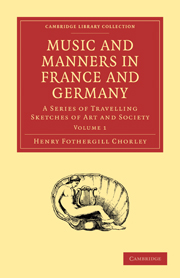Book contents
- Frontmatter
- ADVERTISEMENT
- Contents
- THE GRAND OPERA IN PARIS
- CHAP. I “ESMERALDA”
- CHAP. II THE DROP-CURTAIN
- CHAP. III THE “MYSTERY” OF YOUNG FRANCE.—“ROBERT LE DIABLE”
- CHAP. IV THE ART OPERA — “STRADELLA”
- CHAP. V THE NATIONAL OPERA — “GUILLAUME TELL”
- CHAP. VI DUPREZ
- CHAP. VII THE MASTERPIECE OF FRENCH OPERA—“LES HUGUENOTS”
- THE BRUNSWICK FESTIVAL
CHAP. IV - THE ART OPERA — “STRADELLA”
Published online by Cambridge University Press: 29 August 2010
- Frontmatter
- ADVERTISEMENT
- Contents
- THE GRAND OPERA IN PARIS
- CHAP. I “ESMERALDA”
- CHAP. II THE DROP-CURTAIN
- CHAP. III THE “MYSTERY” OF YOUNG FRANCE.—“ROBERT LE DIABLE”
- CHAP. IV THE ART OPERA — “STRADELLA”
- CHAP. V THE NATIONAL OPERA — “GUILLAUME TELL”
- CHAP. VI DUPREZ
- CHAP. VII THE MASTERPIECE OF FRENCH OPERA—“LES HUGUENOTS”
- THE BRUNSWICK FESTIVAL
Summary
I have adverted to the close connection between the literature and wit of France and its musical drama; to the direct court influences which also, since the time of Charles the Ninth's proclamation, have had their share in determining its colour. To this day there remain features which distinguish the fashionable amateurship of its patrons from any similar encouragement of national or exotic art in England. Les gants jaunes of Paris are better-instructed listeners to music than the corresponding class in London; if they are more despotic in the world behind the scenes, more rigorous in the arrangement of its im-morals, according to a strangely methodical rule and system, they are more intelligent before the curtain. I could point to a box in L'Académie Royale, — arranged with a Sybaritic luxury of gilt and damasked elbow chairs, and a tiny salon behind it for refreshment, or play — where, even on the hundredth night of an opera, long ere the dance is to begin, some two or three of its tenants may be seen from the very commencement of the performance. The rest, as a body, are far more deeply interested in the composition, far more capable of playing their own favourite morceaux on the piano, or of singing the motivi which severally suit their voices, than any number of our own fine gentlemen, who make an effort to drop into their places at our Italian Opera, to hear Rubini's last song, or who begin to listen just before Fanny Elssler is to exhibit the first witticism of her dainty feet, or Cerrito to take her first butterfly flutter in air.
- Type
- Chapter
- Information
- Music and Manners in France and GermanyA Series of Travelling Sketches of Art and Society, pp. 90 - 108Publisher: Cambridge University PressPrint publication year: 2009First published in: 1841



